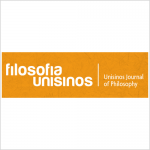Saul Kripke’s naturalized metaphysics
Vol 8, No 2 (2007) • Filosofia Unisinos - Unisinos Journal of Philosophy
Autor: Rejane Xavier
Resumo:
his article starts with an examination of Saul Kripke’s views of the semantics of modal logic and concludes by pointing to some epistemological and ontological consequences of those views that seem to be incompatible with the way empirical science in fact works and progresses. In dealing with the problem of identifying the same objects in different possible worlds, Kripke is led to develop his original positions on topics such as the theses of the fixation of the reference independent of meaning (where he disagrees with Frege) and the noncoincidence between necessary and a priori truths (where he disagrees with Kant). In Kripke’s view, it is a particular type of knowledge – scientific knowledge – that determines what should be considered as essential or necessary. And the statements that represent these a posteriori scientific discoveries “are not,” in his words, “contingent truths, but truths that are necessary in the strictest possible sense.” Thus, in Kripke’s view, our (scientific) knowledge determines without distortion the essential properties of what is real, which turns his ontology into a direct function of the discoveries of empirical science. This “naturalization of ontology”, as shown in the conclusion of this article, is not compatible with recognition of the defeasibility of our semantic or scientific criteria and overloads scientific the endeavor with a metaphysical burden which science itself does not claim and is not capable of carrying.
ISSN: ISSN: 1984-8234
Texto Completo: http://revistas.unisinos.br/index.php/filosofia/article/view/5817
Palavras-Chave: fixation of reference, a posteriori necessity

Filosofia Unisinos - Unisinos Journal of Philosophy
The journal Filosofia Unisinos - Unisinos Journal of Philosophy is published once every four months by Universidade do Vale do Rio dos Sinos.
Articles must be original, unpublished, and not under consideration for publication anywhere else and can be written in Portuguese, English or Spanish
Filosofia Unisinos - Unisinos Journal of Philosophy prints articles, translations and critical book reviews. It also reprints papers that are considered fundamental to the area when authorized written permission is given by the original publisher.
